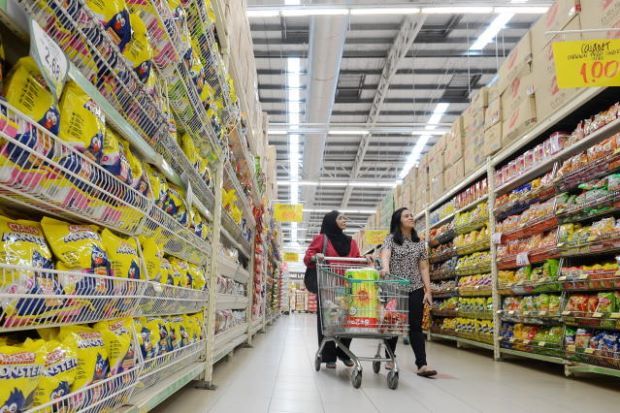Malaysia: Consumers worry about nation’s fiscal status, job security, debt, says Nielsen survey
KUALA LUMPUR: Malaysian consumer confidence remained stable in the third quarter of 2017 but there remains the nagging worries about the nation’s fiscal status, job security and debt, says a Nielsen consumer confidence survey.
According to the findings of its Global Survey of Consumer Confidence and Spending Intentions issued on Tuesday, Malaysian consumer confidence dipped one point to 93 percentage points from the second quarter.
“Whilst confidence level stayed steady, the nation slipped four spots to be 32nd most confident country globally (28th place in Q2 2017),” it said.
Nielsen Malaysia’s managing director Raphael Pereda said the latest survey showed confidence levels across Southeast Asia continues to hold strong with four out of six countries in the region retaining their top 10 spot globally.
Consumers in the Philippines are the second most confident globally (131 percentage points, +1 from Q2 2017) followed by Indonesia in third place (127 percentage points, +6). Vietnam retained its fifth position from previous quarter (116 percentage points, -1) while Thailand inched up a spot to be the ninth most confident globally (113 percentage points, +6).
Singapore improved its ranking by two spots at 29th place as compared to last quarter (94 percentage points, +5).
The average global consumer confidence is 105 percentage points (+1 vs. Q2 2017).
“The consumer confidence level for Malaysia remains on par with that of the second quarter this year, below the neutral threshold, but still remaining at its highest level for over two years,” said Pereda said.
“The higher trend in sentiment observed over the last couple of quarters, coupled with the continued improvement in key economic indicators has also led to the first quarter of growth in fast moving consumer goods (FMCG) this year.”
Malaysian consumers continue to rank the nation’s fiscal status (44%, -3% vs. Q2 2017) and job security (21%, -1%) as their top two key concerns whilst 17% of the survey respondents also list debt as the third most worrisome (17%, -1%).
Despite positive economic indicators, recessionary sentiments among Malaysians continue to remain high (80%).
However, at least one in four respondents are feeling positive that the country will be out of an economic recession in the coming 12 months (27%, compared to 25% in Q2 2017).
Malaysian consumers also continue to remain upbeat on their state of personal finances with 56% perceiving that their state of personal finances to be either good or excellent in the next 12 months (+4% compared to last quarter).
A total of 45% of the respondents also feel confident about the local employment outlook over the next 12 months (+1% vs. prior quarter).
Other key areas of concern that recorded a slight increase compared to the last quarter include work/life balance (17%, up 2% from prior quarter), health (13%, unchanged) and increasing fuel prices (12%, up 4%).
“The Malaysian economy continued to show strong signs of positive growth with a GDP of 6.2% in Q3 2017, yet the number one concern for Malaysian consumers remains with the economy. Many still believe they are in a recession, further highlighting that the trickle effect of the improving economy is yet to fully take effect.
“Despite the fact that none of the economic KPIs indicate that the country is in a recession, consumers continue to believe that the current situation and the future for the country is not positive,” Pereda said.
Globally, Southeast Asian consumers retain their lead when it comes to saving intentions, with Filipinos the top savers.
The survey showed Filipinos are the world’s most avid savers (69%) followed by Indonesians and Thais (68%), tied in second place. Consumers in Singapore (67%, 4th), Vietnam (66%, 6th) and Malaysia (63%, 7th) are all ranked within the list of top 10 when it comes to saving any spare cash after covering essential living expense.
The global average of consumers depositing spare cash into savings is 52% (unchanged from last quarter).
Besides prioritising saving intentions, nearly one quarter of Malaysian consumers have also said that they would divert any spare cash towards investment of stocks/mutual funds (28% vs. 32% in last quarter) and paying medical insurance premiums (22% vs. 25% in prior quarter) while at least two in five intend to pay off debts, credit cards or loans (41% vs. 42% in Q2 2017).
Whilst saving intentions are high among Malaysia consumers, the survey also revealed that Malaysians are ready to spend on holidays/vacations (43%, +1% from last quarter) and new technology products (20%, +1%).
Nearly nine in 10 respondents have said that they have changed their spending habits to improve household savings in the past 12 months (87%, +3% from Q2 2017) – this includes spending less on new clothes (63%, +6%), cut down on out-of-home entertainment (58%, +2%) and switching to cheaper grocery brands (52%, +5%).
“Nevertheless, should economic conditions improve, at least one-third of Malaysian consumers are expected to continue to save on gas and electricity (34%) and spending less on new clothes (33%).
“Whilst many Malaysians want to save for a rainy day, they are generally doing so at the expense of an interest rate which is lower than inflation. Consumers could start spending again but if they do so without first paying off higher interest rate, then they are simply repeating the cycle of spending and increased debt,” Pereda said.
Source: https://www.thestar.com.my/business/business-news/2017/12/19/consumers-worry-about-nation-fiscal-status-job-security-debt-says-nielsen-survey/#Rf51OxKQ4PA0UM24.99


 English
English




